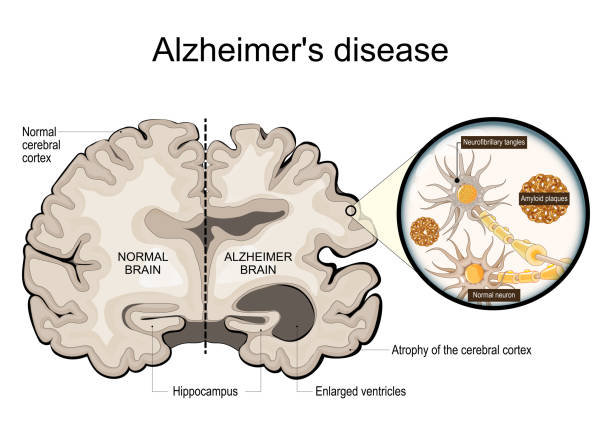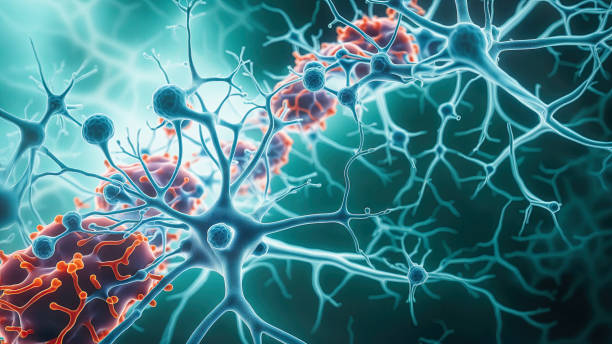Neurodegenerative diseases are conditions that slowly and gradually damage parts of your nervous system, particularly in the brain. The symptoms and effects of neurodegenerative diseases often appear later in life. It covers several different types of diseases, including:
Dementia-type Diseases
These conditions cause ongoing damage to various parts of your brain, leading to the death of neurons resulting in a wide range of symptoms depending on which brain areas are affected.

- Alzheimer’s Disease
- Frontotemporal Dementia
- Chronic Traumatic Encephalopathy (CTE)
- Lewy Body Dementia
- Limbic Predominant Age-related TDP-43 Encephalopathy (LATE)
Demyelinating Diseases
These diseases involve damage or loss of myelin, which is the protective covering around nerve fibers affecting the transmission of nerve signals.
- Multiple Sclerosis (MS)
- Neuromyelitis Optica Spectrum Disorder (NMOSD)
Parkinsonism-type Diseases
These diseases result from damage to specific neurons in the brain that control a person’s coordination and precise muscle movements.
- Parkinson’s Disease
- Other Forms of Parkinsonism

Motor Neuron Diseases
These diseases occur when neurons that control movement die off. Examples include:
- Amyotrophic Lateral Sclerosis (ALS)
- Progressive Supranuclear Palsy (PSP)
Prion Diseases
These are protein misfolding diseases that cause severe brain damage in a short time. Most people with prion diseases do not survive more than a year. The most common example is the Creutzfeldt-Jakob Disease.
How GLP-1 Can Benefit Individuals with Neurodegenerative Diseases
Glucagon-like peptide-1 (GLP-1) receptor agonists are a type of drug mainly used to treat type 2 diabetes and obesity. Recent research shows these drugs might also help treat neurodegenerative diseases, like Alzheimer’s and Parkinson’s.
This hormone is released from the intestines after eating and helps regulate blood sugar by increasing glucose uptake and reducing glucose production from the liver. It also slows stomach emptying and decreases appetite.
Recent studies suggest a link between insulin resistance in the brain and dementia. The similar cellular changes in insulin resistance and dementia have led to terms like “type 3 diabetes” or “insulin resistance of the brain.” GLP-1 receptor agonists are being studied for neurodegenerative disorders because they help control blood sugar, maintain a healthy weight and improve insulin response in cells. There is some debate about the link between GLP-1 drugs and pancreatitis, the overall risk seems low.
The Mechanisms of Action in Neurodegeneration
GLP-1 receptor agonists show several protective effects in Alzheimer’s disease. They promote the growth of neurons, improve neuron survival and increase synaptic plasticity. They also help degrade amyloid-beta plaques by increasing insulin-degrading enzyme (IDe) levels. Also, GLP-1 receptor agonists inhibit tau protein buildup by affecting an enzyme called glycogen synthase kinase-3β (GSK-3β).
These drugs reduce oxidative stress and neuroinflammation, which are common in neurodegenerative diseases. GLP-1 receptor agonists suppress microglial activation and inflammatory cytokine release while at the same time boosting antioxidant enzyme activity.
GLP-1 receptor agonists have been well-studied for their potential benefits in Alzheimer’s disease. In Parkinson’s disease, these drugs reduce neuroinflammation and oxidative stress.
While most research has focused on Alzheimer’s and Parkinson’s, GLP-1 receptor agonists may also help other neurodegenerative conditions. Ongoing studies are looking into their effects on Huntington’s disease and amyotrophic lateral sclerosis (ALS).

Challenges with Using GLP-1 Therapy for Neurodegenerative Diseases
Delivering GLP-1 receptor agonists to the brain is possible but difficult because of the blood-brain barrier (BBB). Researchers are looking into different methods to overcome this.
Safety is another concern, as studies on GLP-1 receptor agonists in neurodegenerative diseases are limited. Potential side effects, such as drug interactions, gastrointestinal issues and low blood sugar levels may be more significant in these patients.
Final Thoughts
Including GLP-1 receptor agonists into clinical practice for Alzheimer’s, Parkinson’s, and other neurodegenerative diseases looks promising. Personalized medicine approaches will be essential to tailor treatments based on individual patient factors, tolerance, disease progression and benefits while closely monitoring for side effects and safety (with long-term use).